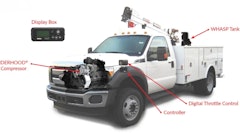Web-based applications are now an integral component of virtually every American’s life, both personal and professional. From online banking programs for consumers, to professional programs that once were installed on local computers and servers, the benefits of these software-as-a-service systems is that they are instantly accessible from anywhere, allowing us to be more mobile, and yet still as productive, if not more so.
This does mean, of course, that some of our personal or professional data is hosted outside of our personal control. Instead, it’s “in the cloud," stored on remote servers that are usually owned and managed by major data hosting providers like Amazon, by the technology developers themselves or through third-party providers.
The primary concern of all computer users should always be security, especially those that manage sensitive client information. Over the 15-plus years that online programs and web-based backup have been available, however, it has been proven that online storage is not only secure, but is actually safer and more reliable than simply keeping the information on your office computers or servers, even when you perform backups in-house. Here's why:
1. Automation is more reliable than people
The main reason why online storage of data is most secure is because it takes away the human element. As with any technology, a data backup routine is only as effective as the weakest component, and human error is the most common contributor to lost data. Whether it’s getting lax on backups and performing them less and less frequently, storing the backups or having a backup drive located in the same office with the computers, or being too casual with passwords and office security protocols, humans are the number one problem with data security.
It's true, technology fails at times, but we humans are more likely to forget even routine things. A central feature to almost all web-based backup systems available for both consumers and professional businesses is that, after initial setup, they automatically perform the functions at pre-scheduled times (such as in the middle of the night, so it doesn’t slow down your computers while you and your staff are using them).
"The very time of year that it’s most important to be getting good backups - the busy season - is the very time that people are too tired and too distracted to remember to make the backups," notes Jeff Knoepke at Alert Management Systems. "Also, the littlest things can be your undoing. Even if you rotate your backup media just like your supplier taught you, all you have to do is accidently set the media to Write-Protected and poof! – no backup."
J.J. Shea, general manager of Solutions by Computer (SBC), says, "Today's cloud-based backups provide proactive verification, meaning the human element is largely eliminated from the verification procedure itself. The rental business owner or manager receives an automatic email notification each time a verification fails. Optionally, an email can be generated by every verification, success or failure.
"In the past, with in-store backups, verification took time away from management and customer service activities: the user had to monitor logs and reports in order to verify good backups. On peak contract days, it often got set aside. Over the past 30 years of rental installations, we've seen many instances where rental owners thought they had good backups, only to realize their error when it was too late."
Shea continues, "The cloud has eliminated this problem for those business owners who take advantage of it. Dashboards that incorporate backup processes have also contributed to the solution. In addition, online backups are secured by encryption and passwords, which makes them more secure than tape backups."
Still, it's a good idea to have a backup for your backup. "Even though cloud backup is automated, that doesn't mean that you should completely stop paying attention to it," says Jason Albus, systems engineer with Point-of-Rental. "You should be getting reports from your cloud backup vendor which means you'll still need to read the reports and make sure things are running correctly and being backed up as they should."
Daniel Ruiz, IT manager at Point-of-Rental adds, "You don't want to only have one backup. The cloud is great but it's based on the internet and internet connections sometimes fail. The safest route to go is to have another backup along with the cloud - the more backups you have, the better. Point-of-Rental has been signing people up for the cloud for three to four years. However, we also have a full encrypted internal backup on the store's server for extra insurance."
2. No worries about natural (and unnatural) disasters
Storing your data in a cloud-based backup also offers the benefit of protecting it in the event of disaster. Whether it's a hurricane, tornado, flood or even a fire, your data is safe because it's not housed on site. Even if every piece of computer equipment at your location is destroyed, the data is protected when it's stored in the cloud.
Knoepke notes it's important to beware of unnatural disasters as well. Those can include vandalism and theft, which are for some a more likely threat than natural disasters.
"When it comes to disasters, it's best to kill two birds with one stone by having offsite backup in addition to the cloud," Ruiz adds. "With offsite backup, you have a system keeping a log of historical backups. Offsite backups really help against disaster."
"Point-of-Rental once had a store that lost everything in a fire," Ruiz recalls. "The store called us to see if there was anything we could do and sure enough, because they had cloud backup, we were able to help. Point-of-Rental was able to get all of their critical Point-of-Rental data back to them with insurance paying for the cost of their servers. In some rare cases like this, you can temporarily get by as soon as the data gets there."
3. Protection in the event of a crash
Besides the human factor, the most common cause of data loss without a fire, theft or natural disaster is system crashes. It’s a simple fact of life in the technology age that we live in that hard drives fail, including those in external backup devices. When this happens, sometimes the data can be recovered, but with total crashes, all is lost. The odds of both your computer and external hard drive failing simultaneously are about nil, but if you haven’t been maintaining a near-perfect backup routine then you might still lose days or weeks worth of client activity. This wouldn’t necessarily result in a total failure of your business, but the time spent recreating that data would put incredible stress on your staff and operations.
"Murphy’s Law applies. Disasters and failures can and do happen, often at the most inconvenient time," Knoepke says. "One slip-up in a local backup routine can cause huge problems if a failure occurs at the wrong time."
Cloud-based backup of data ensures that all of your data is safe even if your computer suffers a fatal crash.
4. Redundancy reinforces security
When it comes to security, online systems also stand above local solutions such as external hard drives or discs, and for several reasons. To start with, they automatically encrypt all data before it is uploaded and the data remains encrypted while it is stored at the backup service provider. Additionally, most advanced systems don’t just back up your data to one location, but to at least two or more locations in geographically diverse areas of the country.
With no backup or with backup in your office, the data is at risk from fire, flood, tornados, earthquakes, hurricanes, theft, computer crashes and countless other disasters. With the redundancy and geographic separation of web-based backup, however, it is virtually impossible for the data to be lost because of one or more of these events. In addition to government-level encryption, all of the major data backup providers also have strong physical security at their locations, including armed guards, biometric technologies and many have security audits and testing, including meeting the requirements of the Statement on Standards for Attestation Engagements (SSAE) No. 16, which replaced SAS 70 as the new attestation standard for service organizations.
"Rental businesses store tons of sensitive customer information (names, addresses, purchase histories and pricing), information that could be dangerous in the wrong hands," Knoepke says. "Local backups (tapes, external drives, etc.) can be lost or stolen, exposing all of this data. In contrast, on-line storage is encrypted and safely sheltered, all automatically."
For those who note that even the government, banks and other financial institutions get hacked, yes, it's true no system is perfect. But from a hacker’s perspective, which would be easier to target: Several small rental businesses with bare bones security, or a technology powerhouse? The odds of cloud-based client data being compromised are much less than data stored within a firm’s office.
5. Support during restoration
What would you do if your client data went MIA tomorrow? With cloud-based, online backup, if one of the above disasters did happen to the computers in your office, the client data and the entire contents, programs and even email on those computers could be quickly retrieved and installed on brand new computers. With no backup plan in place, your odds are better at a Las Vegas slot machine, and even with a local system in place, you might be flipping a coin.
"In addition to automating the backup, a complete solution has to include a recovery plan with immediate access to all the resources needed to get running again right away," Knoepke says.
And the plan must be tested regularly. "Often, the backup performed manually is not even good or so old that it cannot be used," says Patrice Boivin, president and CEO of Orion Software. "We had cases where the backup was done for years but it was never tested. Businesses need to do a disaster recovery simulation annually."
Shea at SBC says off-site backup ranks near the top of the list when it comes to value for price in the rental business. "The data intensive nature of rental means that data loss is disastrous. Gaps can take hundreds of hours to recreate manually. Even with in-store tape backup, the process is slow, and the tapes are often faulty."
He continues, "Our online backup process is an affordable annual subscription that restores the system with minimal downtime. With authority from the rental business, we can move quickly to download the backed up database and load it either to a replacement system or to our cloud, to keep the rental business running. We have a lot of customers using our cloud-based servers for SaaS applications - these servers work equally as well for data access when someone needs help."
Michael Saint, president of Corporate Services, LLC, says there are many excellent reasons to use a cloud-based backup system, but there are limitations. "For example, a typical small business might accumulate around 50 GB of data and are connected to the Internet with a 1.5-megabit connection (T-1 or DSL). The time required to back up their data would be over 3 days," he states. "Any backup system requires well-designed, well-practiced procedures to be successful. This is especially true of cloud systems where the concern is not 'backup' but 'recovery' when the data is lost and must be restored."
If you have to recover your entire system from the cloud, it could take a very long time to re-download data, unless you only have a few files to download, adds Albus. If needing to recover your entire system, however, a local backup will make the process much faster.
"When it’s all said and done, the cloud is great and strongly recommended by most IT professionals," Ruiz says. "So, backup to the cloud and encrypted backup locally. Then you'll have yourself covered under both instances, having the best of both worlds."



























